Press Conference Announced In Honor of International Day of Zero Tolerance to Female Genital Mutilation/Cutting (FGMC)
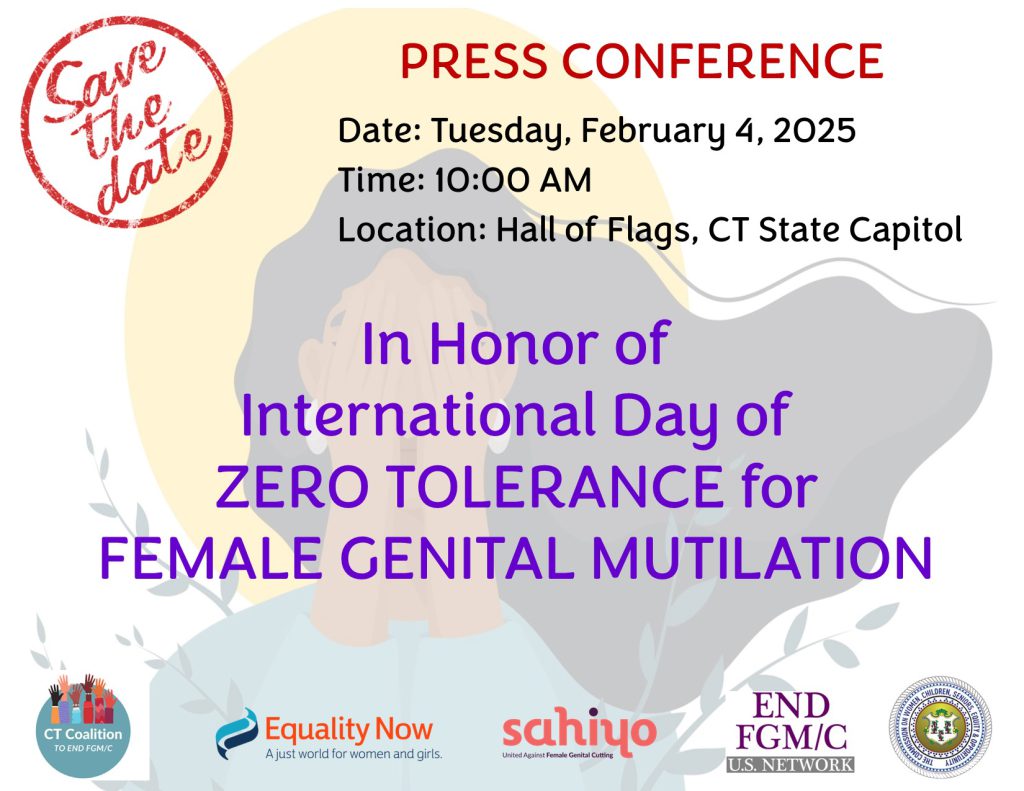
Hartford, CT – In Honor of International Day of Zero Tolerance for Female Genital Mutilation/Cutting (FGMC), State Representative Jillian Gilchrest and State Representative Nicole Klarides-Ditria along with the Connecticut Coalition to End FGMC will hold a press conference to raise awareness about this critical issue, discuss ongoing advocacy efforts, and highlight House Bill 6596: An Act Concerning The Prevention Of Female Genital Mutilation, a proposed bill to prohibit the practice of FGM/C in Connecticut. Connecticut remains one of only nine states without legislation banning this harmful practice. An art installation visually representing the number of women and girls who have undergone or are at risk of FGM/C in Connecticut will be installed on the lawn of the State Capitol before the press conference and will be available for viewing all day. Event Details: When: Tuesday, February 4, 2025, at 10:00 AM Where: Hall of Flags, Connecticut State Capitol Agenda Highlights: Opening Remarks: Representative Jillian Gilchrest & Representative Nicole Klarides-Ditria will welcome attendees and outline current legislative efforts to pass a law protecting all girls from FGM/C in Connecticut Remarks from the Lieutenant Governor: Susan Bysiewicz will read the Governors proclamation and make a few comments Survivor Testimonies: Hear from survivors Zehra Patwa and Mariya Taher, who will share their lived experiences and perspectives Medical Expertise: Dr. Kate McKenzie, Director of the Yale Center for Asylum Medicine, will provide insights into the medical and psychological impacts of FGM/C Legislative Call to Action: Bipartisan leaders will discuss the importance of uniting to enact protective legislation Q&A Session: Media representatives will have the opportunity to ask questions and engage directly with speakers Why This Matters: Female Genital Mutilation/Cutting is a grave violation of human rights, with devastating health consequences for millions of girls and women worldwide. Despite its global recognition as a harmful practice, FGM/C remains a concern that demands urgent attention and action. Members of the press, advocates, and the public are invited to attend this critical event to learn more about the fight against FGM/C and how Connecticut is taking a stand. For additional information or to schedule interviews: Rep. Jillian Gilchrest (D-18 district) Phone: 860-240-0492 Email: Jillian.Gilchrest@cga.ct.gov Rep. Nicole Klarides-Ditria (R-105 district) Phone: 860-240-8700 Email: Nicole.Klarides-Ditria@cga.ct.gov Rosemary Lopez, CWCSEO Women’s Legislative Policy Analyst Phone: 959-900-5805 Email: Rosemary.Lopez@cga.ct.gov Join us in standing for a future free from FGM/C in Connecticut. Together, we can make zero tolerance a reality. Related: Interview with Zehra Patwa of the Connecticut Coalition to End FGM/C The Connecticut Coalition to End FGM/C Interview Series: Caitlin LeMay
The Connecticut Coalition to End FGM/C Interview Series: Caitlin LeMay

By: Juliet Shires Policy interns at Sahiyo have been interviewing members of the Connecticut (CT) Coalition to End FGM/C to learn more about them and their important work. Recently, Sahiyo’s policy intern, Juliet Shires, talked to the Executive Director of the U.S End FGM/C Network and CT Coalition member, Caitlin LeMay, about her personal experiences as an advocate as well as the Network’s role in supporting the CT Coalition’s efforts. Misconceptions Around FGM/C Caitlin LeMay initially echoed the same belief that is found amongst many Americans, particularly those who identify as white, that FGC is only a practice that takes place in African, Asian countries, or basically anywhere but here. “I’m surprised I wasn’t more familiar with it earlier…I think that it really speaks to what it’s like being raised in the US and the misconceptions around how FGM/C is not seen as an issue here. I was susceptible to those same misconceptions and miseducation about FGM/C and its impact in the United States. I think because of that…it fuels me even more to spread awareness and spread education about FGM/C [in the US]…I’ve really found a home here and a lot of passion for this work.”. Caitlin continued to expand on these common misconceptions surrounding FGM/C, making it clear that it is very much a practice that affects the U.S. In fact, American doctors used to perform FGM/C to treat perceived ailments such as “lesbianism”, masturbation, and hysteria. She points out that the first step to ending this practice is recognizing that these problems exist within the U.S. “The United States has a long history, and present…of practicing FGM/C in our medical institutions as a regular practice. And we are yet to reconcile with that… [It was an] institutionalized practice to control women and their bodies and their behavior.” These racial stereotypes only serve to perpetuate problems in the U.S. “The root of the US not reconciling with [FGM/C]… is completely rooted in racism and anti-blackness. Not being able to see what is happening here as FGM/C is all rooted in racism, xenophobia, and anti-Blackness. We need to call it what it is… Education is our best tool [to combat this], it’s where we’ve made the best progress.” The Network’s Role in the Connecticut Coalition to End Female Genital Mutilation/Cutting In our interview, Caitlin also explained how the Network helps the CT Coalition, using their experiences working with other state-based coalitions to guide fellow organizations and volunteers in the CT Coalition. They also make sure to tailor their advice according to the state, keeping in mind that their communities have the most knowledge of what their state needs and how to achieve their goals. “They know who would be the best representatives or senators to reach out to sponsor the bill, to champion them … Engaging the local communities to take the lead on that and really engaging them because they know best.” Leading through locals goes hand and hand with allowing survivors to take the lead in determining what their needs are and what resources they need to address them. In other words, to determine what would be best “not just for Connecticut but for survivors in Connecticut.” It is a collaborative effort that involves debating and discussing with one another to create a solution that works for all survivors with varying backgrounds and experiences. Caitlin’s and the Network’s ultimate goal is to ensure that state coalitions are safe spaces, where survivors can feel heard and have the power to make change in their communities. “There’s a place for everybody. No matter what your comfort level or what your capacity is, there’s a place and there’s a way to get involved.” Caitlin and the Network assisted in the passage of Bill SSD 5453 in Washington, a piece of legislation aimed at ending the practice of FGM/C in the state. She highlights it as a prime example “of what can happen when there are these state coalitions that are survivor and community-led.” The bill achieved the coalition’s goal of fostering collaboration between state departments and community members who best address survivors’ needs. Now that Washington state has started implementing the bill, Caitlin hopes that Washington can become an example for other states passing new legislation around FGM/C: “We haven’t seen that before, so I think it’s such a great example and could really provide an example for other states. We really hope that other states see this and learn from it.” Throughout our conversation, Caitlin highlighted the importance of the progress in Washington state, and how it relates to the work that still needs to be done in Connecticut, and across the country. She also validates how disappointing and frustrating it can be when states like Connecticut don’t prioritize legislation around FGM/C but knows it’s also important to recognize that “we didn’t go backward, we just didn’t go forward.” Furthermore, it’s important to take a step back and look at the larger, global movement toward ending FGM/C and that’s something that can help encourage and provide us with hope. Still, she encourages anyone passionate about the issue of FGM/C to get involved in advocacy work as there’s work to be done all across the US – even in states that already have a law in place. “It’s all connected. Progress that is made in CT helps the movement in The Gambia. Progress made in The Gambia helps movements in Europe or Asia… Any glimmer of progress that we can find can help get us to tomorrow, and get to the next day, and keep us moving forward to that ultimate end goal of ending FGM/C globally.” We would like to thank Caitlin LeMay for taking the time to sit down with our policy intern and for her continued work with the CT Coalition and the U.S. End FGM/C Network. About The U.S. End FGM/C Network As a member of the Connecticut Coalition, the U.S. Network helps support the coalition’s efforts using the resources it possesses as a national organization.
The Connecticut Coalition to End FGM/C Interview Series: Jo Keogh
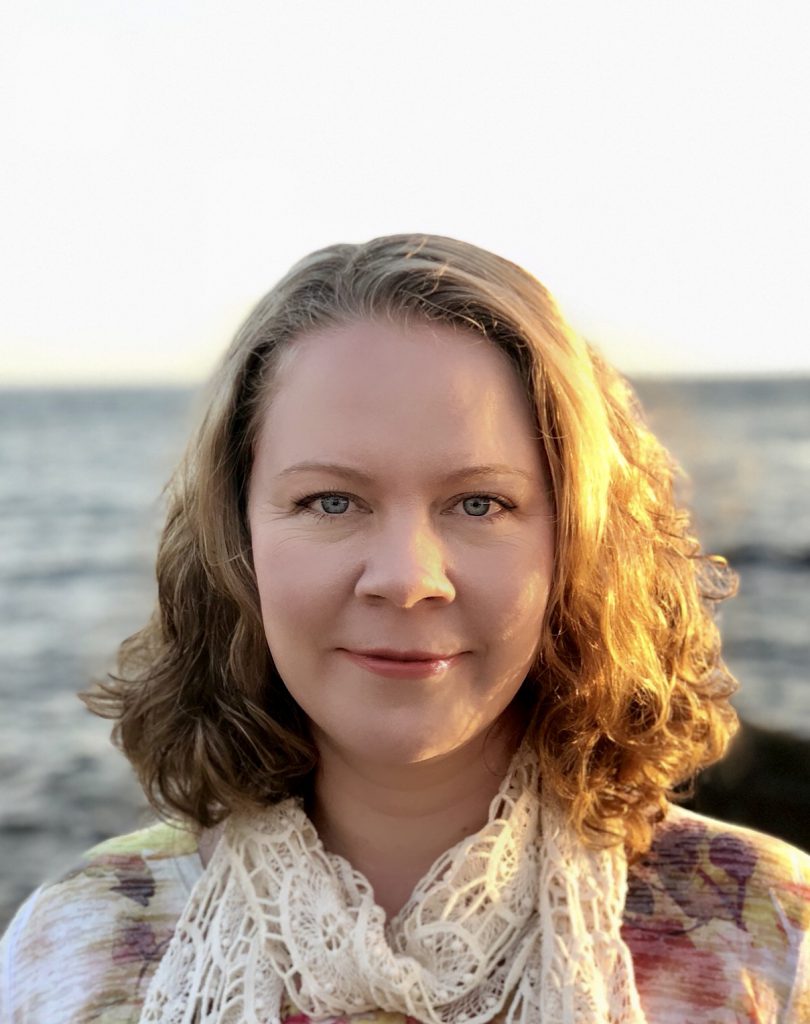
By Juliet Shires Recently, policy interns at Sahiyo have been interviewing members of the Connecticut (CT) Coalition to End FGM/C to learn more about each individual and to better understand all the important work they contribute towards ending FGM/C. The information below comes from an interview between Sahiyo’s former policy intern, Azalieh Erawoc, and CT Coalition member, Jo Keogh. Jo Keogh, a member of the Advisory Board at Sahiyo, is a founding member of the Connecticut Coalition to End FGM/C. She is passionate about issues surrounding the practice of FGM/C due to her background as a mental health counselor working with women with post-traumatic stress disorder resulting from gender-based violence. “Trauma is one of the biggest issues we have to deal with personally, societally, globally,” says Keogh, “I feel that it influences a lot of what is going on in the world today…without systemic change, healing on an individual level becomes impossible for a lot of populations.” Keogh got involved with FGM/C advocacy after reading about how a 2017 Michigan case overturned federal law, resulting in states being responsible for criminalizing FGC and conducting educational outreach. Keogh looked for a Connecticut law to protect those at risk of undergoing the procedure, but there were none. This inspired her to search for any bills about the issue in her state. Eventually, she reached out to Mariya Taher and Sahiyo after seeing their success in Massachusetts, and thus, the Connecticut Coalition to End FGM/C was born. Keogh emphasized the need for better education surrounding FGM/C for meaningful change. “Education is everything,” says Keogh.”In a perfect world, I wouldn’t have a job anymore…I wouldn’t be working with discrimination claims during the day and I wouldn’t be working with traumatized women at night. None of that would be necessary”. Keogh herself admits that at the beginning she didn’t know much about FGM/C, assuming it was a practice that didn’t occur in today’s world, let alone in the United States. “95% of what I know now about FGM/C, I didn’t know at the beginning. I just knew I didn’t want it to happen in my state…like me, the mass majority of people in this country have no idea what’s going on.” Keogh emphasizes the need for better education around FGM/C, explaining that many people ignore issues with an “it doesn’t affect me” attitude. The key is finding a way to educate people in a way that sticks and doesn’t just become a social “cause of the moment” to enact long-lasting change. Furthermore, Keogh recognizes how non-survivors of FGM/C should use their privilege to better educate themselves. She highlights her experiences of “shutting up and observing” when speaking with survivors in order to learn more about how FGM/C has affected others. Keogh has learned we shouldn’t make generalizations when speaking to survivors, and understands that not all women view their experiences as negative (for example, some women who have undergone FGM/C wear their experiences as a badge of honor). Not everyone will agree with the notions you may possess and it is important to remember that when doing this work, any advocacy “always, always, always must be survivor-centered.” Keogh also discussed the importance of mental health for advocates trying to improve laws around FGM/C. “I think sometimes with advocacy there’s this sense to be “on” all the time […] and to keep fighting until it’s done,” she says. “And I think it’s really important to give ourselves permission to tag out for periods of time without feeling guilt or that we’re “not doing enough.” “It’s important to figure out how much of yourself you can give at any point in time and to honor that,” she continues. “And not have guilt around that. If we come into the fight with a quarter of ourselves we’re just going to get knocked out. So, if we have to tag out, it’s ok. We can always come back in. It doesn’t mean we don’t care, it doesn’t mean we’re not passionate, it just means that we’re human”. Keogh encourages anyone who wants to be involved to participate knowing everyone has a unique set of skills to bring to the Coalition: “All of us have a particular constellation of knowledge that nobody else on the planet has. Advocating from that place is, I think, really powerful”. Looking forward, Keogh is optimistic about the future of legislation in Connecticut and the work ahead of the Connecticut Coalition. “What I’m seeing is women legislators, specifically, getting angry… Anger is one of my favorite emotions. I think anger is the emotion that is the closest to love, because we only get angry about what we value, [so if] they’re angry about it, it means they value the issue. They value the idea that women and girls should have protections against being cut in this state. Passivity is the death of an issue.” We would like to thank Jo Keogh for taking the time to sit down with our policy intern and for her continued work with the CT Coalition. To see the other interview spotlights we’ve conducted click here. Want to get involved? Visit https://endfgmcinct.com/ for more information or contact the CT Coalition Volunteer with Sahiyo Sign the petition to end FGM/C in CT
Building Support for the Connecticut Coalition to End FGM/C After Failure in 2024 Legislative Session

By Juliet Shires In the 2024 legislative session, the Connecticut Judiciary Committee failed to raise a bill that would protect children from female genital mutilation/cutting (FGM/C). Rep. Jilian Gilchrest (D) would have sponsored the bill to create educational and outreach programs, issue civil remedies for survivors, and make FGM/C a clear criminal offense in the state. This marks the need for renewed efforts to build a stronger coalition to address this issue in legislation. Zehra Patwa, a survivor of FGM/C, U.S Advisory Board member for Sahiyo, and CT resident outlines the disappointment many feel at the negligence of not raising this bill despite widespread support: “I’m extremely disappointed that, despite strong support from both sides of the aisle, the bill to protect girls was not raised this session. Protecting the bodily integrity of girls could not be more important especially as we know, anecdotally, that the practice of FGM/C thrives in secret. This bill would have protected girls from the practice but also would have cared for those who have undergone this practice. Not having this bill pushed through puts girls and women in danger and tells them “You are not important”. That is unacceptable in my opinion.” The Connecticut Coalition to End FGM/C was formed in 2020 by individuals who were concerned about Connecticut being only one of nine states without legislation banning the practice of FGM/C. One such Connecticut resident included Jo Keogh, a psychotherapist who worked with organizations such as Sahiyo and the U.S. End FGM/C Network to form the original Coalition: “About 95% of what I know now about FGM/C, I didn’t know at the beginning [of the coalition]. I just knew I didn’t want it to happen in my state,” says Keogh. Furthermore, there was fear that Connecticut could become a “safe haven” for people seeking to perform FGM/C from neighboring states in which FGM/C is illegal. The CT Coalition aims to bring an end to the practice of FGM/C in the state by advocating for a holistic bill that includes educational outreach and input from the community, including those impacted by the FGM/C, such as survivors. One way the Coalition has garnered support for a bill is through a Change.org to ban FGM/C which has received over 80,000 signatures since its start in 2018. The recent failure in the Connecticut legislature has shown the continued need for the Coalition’s continued work. Over 2,600 girls are at risk of undergoing FGM/C in Connecticut, despite it being globally considered a human rights violation. We need to urge the legislature to prioritize the passage of legislation surrounding FGM/C by calling on your representatives in Connecticut to take action in the next legislative session. Want to get involved? Visit https://endfgmcinct.com/ for more information or contact the CT Coalition Volunteer with Sahiyo Sign the petition
Calling on the CT legislature to protect girls from FGM/C
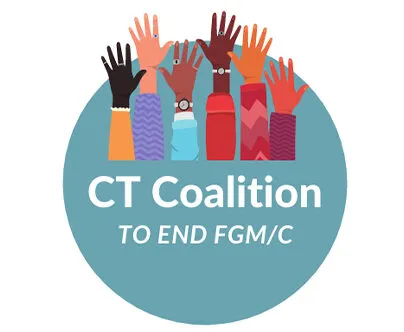
A bill to protect children from female genital mutilation/cutting (FGM/C) in Connecticut (CT) has not been raised by the Connecticut Judiciary Committee in the 2024 legislative session. This news comes as a shock to many survivors of FGM/C and anti-FGM/C activists who have been campaigning for the bill to be introduced. The bill would have been sponsored by Rep. Jilian Gilchrest (D), and would have created education and outreach programs, issued civil remedies for survivors, and created better access to healthcare for survivors of FGM/C. Additionally, the bill would have made it clear that FGM/C is a criminal offense in Connecticut. Currently, Connecticut is only one of nine states left in the U.S. that have no explicit legal protections against FGM/C. Over 2,600 girls are at risk of experiencing FGM/C in Connecticut. Around the country, over half a million women and girls are at risk or are survivors of the practice, according to the Centers for Disease Control and Prevention. Additionally, Connecticut is surrounded by states that have outlawed the practice including New York and Massachusetts. By not following suit, Connecticut could become a safe haven for people who are seeking to practice FGM/C on girls from other states where the practice is illegal. Let’s urge the Connecticut legislature to prioritize the passage of this crucial legislation because every girl deserves to grow up safe and empowered. Join us in advocating for the protection of girls from female genital mutilation/cutting (FGM/C) by calling on your representatives in Connecticut to take action. Your support is crucial in safeguarding the rights and well-being of vulnerable children in Connecticut. Sign this call to action now! For more information, please visit the CT Coalition website.
Zehra Patwa on Sahiyo and the Coalition to End FGM/C’s recent panel discussion with Connecticut legislators – and why it was a positive step forward
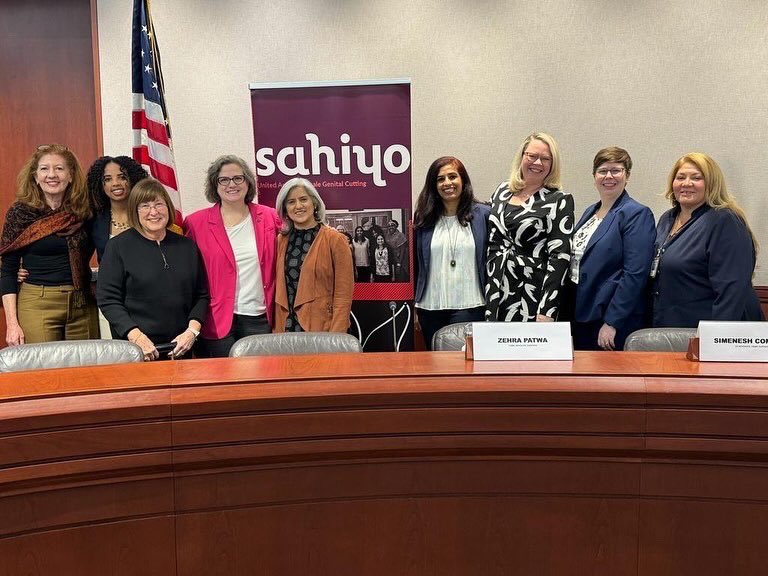
By Sheena Vasani Connecticut is one of nine states that have yet to enact a law protecting children from FGM/C, which is why Sahiyo along with other Connecticut Coalition to End FGM/C members recently held the “Preventing FGM/C in Connecticut – Why Comprehensive Laws Matter” event. On January 25th, panelists educated legislators about the urgent need for FGM/C laws in Connecticut, highlighting their personal and professional experiences connected to FGM/C while sharing resources to learn more and support survivors. Panelists included FGM/C service providers, various women’s rights advocates, FGM/C survivors and advocates and of course, Sahiyo’s very own co-founder and U.S. Executive Director, Mariya Taher. I had the opportunity to talk to one of these panelists, Zehra Patwa. A resident of Connecticut, Zehra has lived in the state for 28 years. She is also the co-founder of WeSpeakOut, an organization that aims to help empower women and end FGC in the Bohra community. During our conversation, Zehra reflected on the event and why she felt it was a success, while making it clear why all Americans should care about outlawing FGM/C in Connecticut. Urge the Connecticut State Legislature to outlaw FFM/C by clicking here and signing this petition! Why did you decide to participate in the event? When I found out that I had been cut – and that my community was one that cuts girls – I was 42 years old. To this day, I have no recollection of my cutting, but it felt like such a violation so I started [speaking out]. It just felt like the right thing to do – how could it not? I’ve been lucky to have this great life, and, yet, there are women who, to this day as adults, suffer psychological and sexual impact because this happened to them. Could you tell me about your experiences at the event? What stood out for you? All the panelists were so well prepared that we came across as very organized, and professional. And I think that’s what the legislators needed to hear. I imagine it might have been different if we had started wailing and crying, but [we showed] that we really understood all of the aspects of this issue, and its sensitive nature.We were all able to give a different perspective on the issue and amplify why we needed a law in Connecticut. What kind of insights, if any, did you gain? I was really heartened by the fact that there was so much support and I know the coalition has worked very hard to build that support. Sometimes, it’s like you’re crying out into the void and it feels like nothing is moving forward, but now we’ve arrived at this point. I realize that all of those small steps that we took – reiterating our experiences over and over again – really helped as it culminated in where we are today. So that was pretty powerful. I felt faith in the process again. Why do you think Connecticut is one of the nine states that has yet to outlaw FGM/C? I think the biggest reason is that they didn’t want to enact new criminal laws that might impact immigrant communities. People want to be sensitive to black and brown bodies that may have come from communities that cut their daughters. I applaud Connecticut for this sensitivity but in the end, FGC needs to stop and girls need to be protected. Why do you think those who live in Connecticut – and indeed, Americans generally – should care about outlawing FGM/C? People don’t think that girls in Connecticut are at risk. Yet the fact is, we’re one of the only states that does not have an anti FGM/C law so we could easily become, if we’re not already, a destination for cutting. We absolutely do not want to be known for that. There are [also] communities who cut their daughters who have been in America for generations – they’re not new immigrant communities. So, as Americans, we should be taking care of our communities. I see this FGM/C law as a simple bill to pass. It fits in with other services that are already available and provides specific FGM/C related education and support for prevention and care. [But] at the heart of this, there is a little girl who is suffering, and is going to potentially suffer all of their life, because they’re told they’re not good enough and need to be fixed. That’s just not a humane way to view a child. We give parents a lot of leeway, but parents don’t – or can’t – always make the best decision. I realize that there are parents who feel very pressured to do this by the elders in their family or community. If we have a law that protects girls from FGM/C, it would give parents the strength and backup to say no. They can [tell people in their community] “look, I don’t want to be a criminal. If I protect my child, I avoid the risk of prison.” What can we as activists do to help outlaw FGM/C in Connecticut? Spread the word that this is happening here and that this is very much a contemporary practice. We don’t have numbers [for Connecticut] as this is such an underground practice but as I said on the panel, that number almost doesn’t matter. If one girl is cut, that’s one too many. Education is the key. Up until 10 years ago, I didn’t even know this was happening in my community. I grew up with very educated, talented women [with] great careers who were impressive mentors and role models, and my community was pretty progressive. But […] all of those women were cut and many of them also cut their daughters. This was a practice that people just accepted as being a fact of life in the community. But with education and shared stories, that is changing. You can watch a recording of the “Preventing FGM/C in Connecticut – Why Comprehensive
Connecticut Hosts a Legislative Briefing on Jan 25th
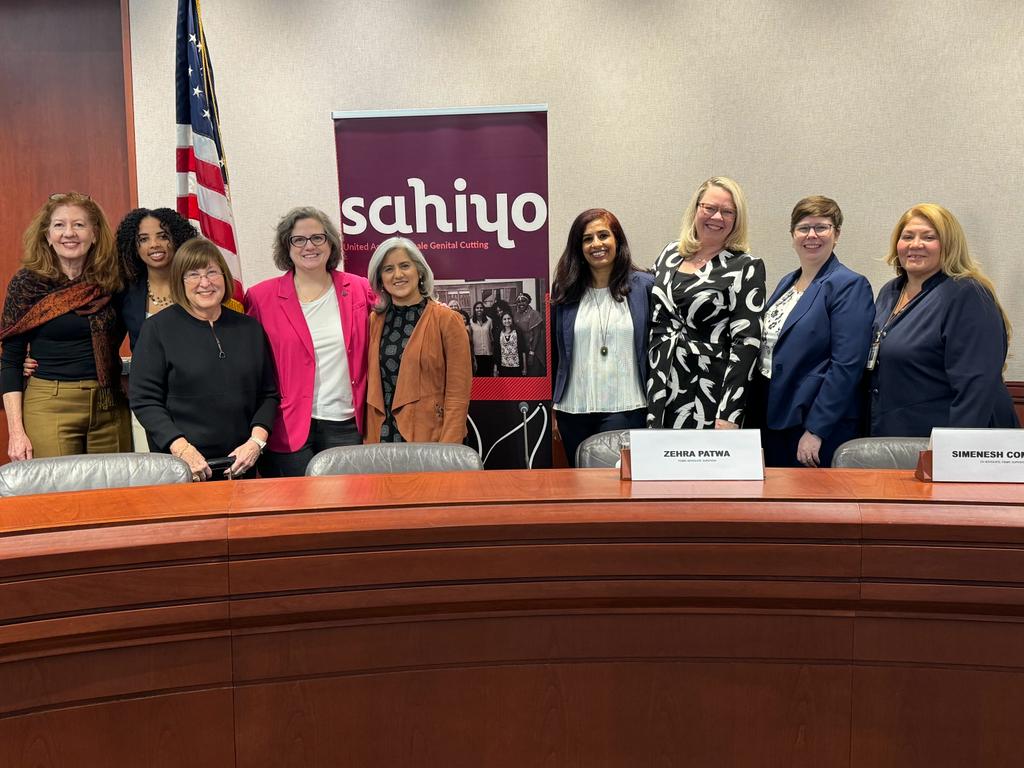
On January 25, 2025, the Connecticut (CT) Commission on Women, Children, Seniors, Equity and Opportunity, Representative Jillian Gilchrest, CT General Assembly Bi-Partisan Women’s Caucus, and the CT Coalition to End FGM/C held an event, just prior to the next legislative session, entitled Preventing FGM/C in Connecticut – Why Comprehensive Laws Matter. Special guests and co-hosts included Lieutenant Governor Susan Bysiewicz and the Governor’s Council on Women & Girls. The panel discussion that occurred during the event provided timely information and resources for legislators and their staff about FGM/C in the United States, as well as the need for comprehensive state laws to end the practice. Panelists shared their experiences and lessons they learned from legal reform processes in other states, which highlighted the important role of the law in changing social norms as well as protecting survivors, girls at risk, and society as a whole. The diverse panel of international, national, and local experts included women’s rights advocates, FGM/C service providers, and FGM/C survivors such as: Moderators: Rep. Jillian Gilcrest Steven Hernández Panelists Siminesh Comollo, CT Coalition to End FGM/C Caitlin LeMay, The US End FGM/C Network Zehra Patwa, Co-Founder and US Lead, WeSpeakOut Mariya Taher, Sahiyo: US Jill Thompson, Equality Now To date, 41 US States have enacted laws prohibiting the practice of FGM/C. Connecticut is one of nine states that has not yet addressed this harmful practice. This event was held in partnership with Sahiyo U.S.ahiyo U.S., Equality Now, and, the US End FGM/C Network.S End FGM/C Network. Watch a recording of the event here. In support of passing a law on FGM/C, this February 6th – International Day of Zero Tolerance for FGM/C, Governor Ned Lamont issued a Proclamation and Lieutenant Governor Susan Bysiewicz issued a Citation to commemorate the day.
Legislative Roundtable held in Connecticut to discuss FGC
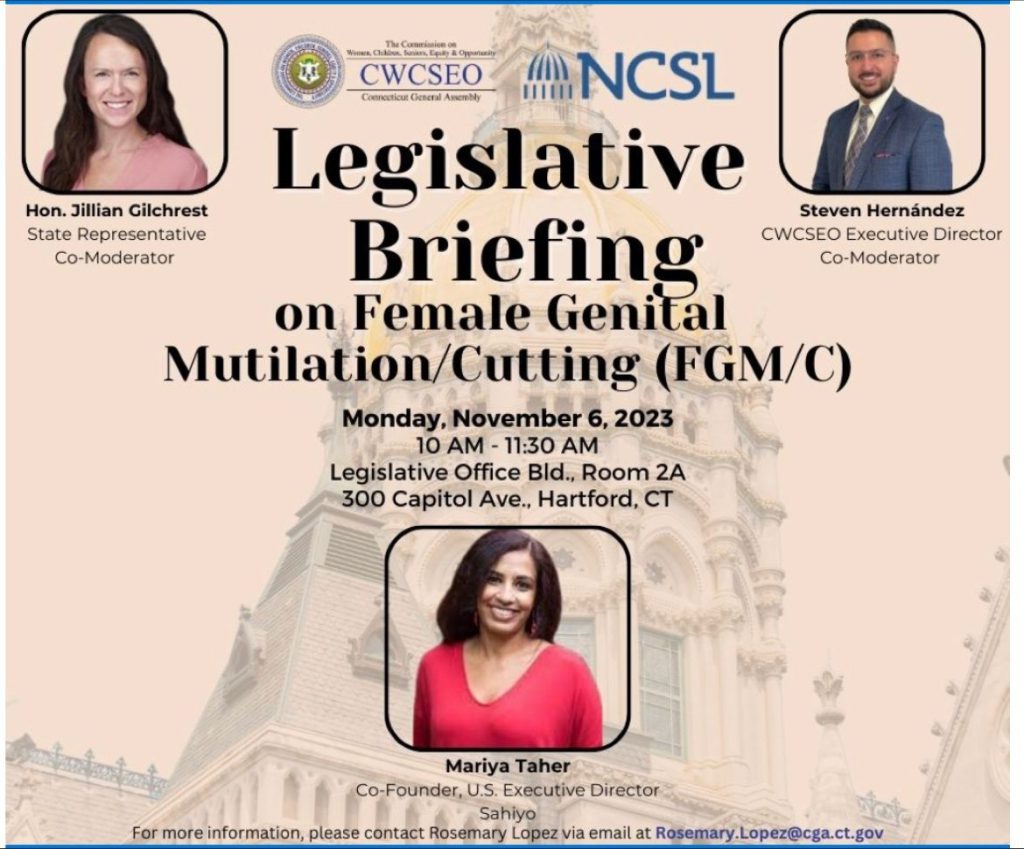
On November 6th, Sahiyo, as part of the Connecticut Coalition to End FGM/C, supported a legislative briefing on the topic of female genital cutting (FGC) hosted by the Commission on Women, Children, Seniors, Equity and Opportunity (CWCSEO) and Connecticut Representative Jillian Gilchrest. Special guests included Mariya Taher, Co-Founder and U.S. Executive Director of Sahiyo, as well as experts from the National Conference of State Legislatures (NCSL). Connecticut remains one of only 9 states in the U.S. yet to address this human rights violation in any manner; this briefing provided insights into the legislative landscape surrounding FGC in the U.S., as well as progress made, challenges faced, and how to move forward in addressing FGC. NCSL also summarized the laws addressing FGC in the 41 states. The Connecticut Coalition to End FGM/C will continue to advocate for a bill to be introduced into this next legislative cycle, starting in January 2024, in hopes that CT legislation will recognize the need to promote a safer, healthier future for all in the state. Learn more about Sahiyo’s policy work here.
Connecticut Governor and Lieutenant Governor officially recognize International Day of Zero Tolerance of FGM/C
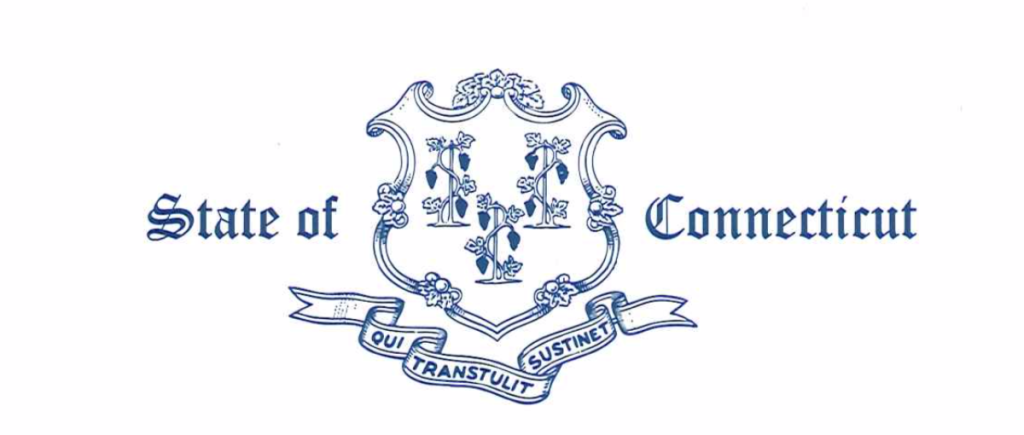
Sahiyo and the Connecticut Coalition to End FGM/C are so very pleased that Governor Ned Lamont issued an official proclamation, and Lieutenant Governor Susan Bysiewicz issued an official citation, both recognizing Feb 6th as Day of Zero Tolerance of Female Genital Mutilation/Cutting in the state of Connecticut. Language for the Governor’s proclamation can be found below: Language for the Lieutenant Governor’s citation can be found below:
CWCSEO issues press release on International Day of Zero Tolerance for FGM/C
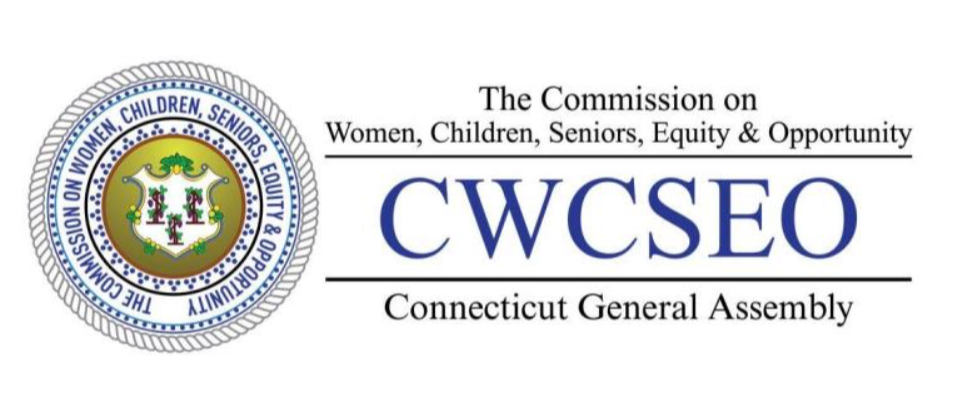
February 6th is the International Day of Zero Tolerance of Female Genital Mutilation/Cutting, a day designed to promote the elimination of Female Genital Mutilation/Cutting by 2030 through efforts to engage whole communities and focus on human rights, gender equality and attention to the needs of women and girls who suffer from its consequences. The United Nations calls on the global community to reimagine a world that enables girls and women to have voice, choice, and control over their own lives. Female Genital Mutilation/Cutting is the altering or injuring or removal of the female genitalia for non-medical reasons to control a girl’s sexuality and make her acceptable for marriage and to the community in which she lives. It is usually performed on young girls between the ages of birth and puberty. It is an extreme form of gender-based violence that is recognized as a human rights violation and a form of torture. The Commission on Women, Children, Seniors, Equity and Opportunity (CWCSEO) of the General Assembly along with the CT Coalition To End FGM/C (survivor-led coalition) are working on building holistic solutions to support survivors and prevent future generations of girls in the State of Connecticut from experiencing FGM/C. We are working with a diverse coalition of stakeholders, advocating for comprehensive legislation that will help protect girls from FGM/C, provide survivors with support services, raise awareness of the harm FGM/C causes, and educate frontline professionals on how to provide culturally specific and sensitive care. “While the State of Connecticut has a robust community of advocates and people with lived experience working to end this form of gender-based violence, the state has been an outlier in its silence among its neighbors and in the nation. This comprehensive legislation would ensure that CT join our sister states in protecting children fromharm.” Steven Hernández, Executive Director of the Commission on Women, Children, Seniors, Equity and Opportunity. “As a long time, Connecticut resident, I am heartened by Governor Lamont’s proclamation about International Day of Zero Tolerance of FGM/C as it sends the message that a harmful cultural practice that people think only happens far away from here, is actually occurring in our state. This acknowledgement is the first step in eliminating this practice. I look forward to strong support of the bill to end FGM/C and protect parents and their daughters from the pressure to cut and be cut.” Zehra Patwa, FGM/C Activist/Survivor and Co-founder of WeSpeakOut and member of the Coalition. About the CWCSEO: The Commission on Women, Children, Seniors, Equity and Opportunity under Sec. 105. Section 2-127 of the Connecticut General Statutes to focus on issues affecting each of the following underrepresented and underserved populations: Women, children and the family, elderly persons, African American, Asian Pacific Americans, and Latinos and Puerto Ricans. Focus its efforts and quality of life to the above-mentioned populations to assure that all are healthy, safe and achieve educational success; free from poverty; and free from discrimination. As a non-partisan arm of the General Assembly, the commission monitors, critiques and recommends changes to legislation. As a non-partisan arm of the General Assembly, the agency monitors, critiques and recommends changes to legislation. The commission serves as a liaison between government and its diverse constituents, and convenes stakeholders, including the business, non-profit and educational communities, local governments, and the media, to promote awareness. View the official press release here.
